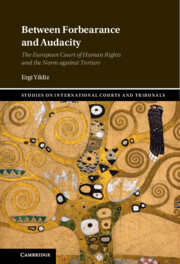Acknowledgments
Writing this book was like an archaeological dig, not only through the history of the European Court of Human Rights and its anti-torture jurisprudence but also a dig through my own drafts that took shape over years and years of work. While the initial idea behind this book was my doctoral dissertation that I wrote at the Geneva Graduate Institute, to my chagrin, I ended up writing an entirely new manuscript – one that truly reflected the maturation of my knowledge of the Court and the norm against torture and inhuman or degrading treatment. My analysis and findings were shaped in different sites of research with the support of several co-conspirators. I am particularly indebted to my interviewees, including the judges and the Registry lawyers at the European Court of Human Rights, as well as human rights experts and members of civil society organisations. My understanding of the issue got sharpened in the course of our conversations. I am also grateful for the financial support from the Swiss National Science Foundation (grant agreement no. 149034), which allowed me to spend some time at the Court and undertake these interviews, and complete my dissertation research.
I began thinking about the book and the main argument during my research stay at the iCourts at the University of Copenhagen under the supervision of Mikael Rask Madsen. Later, in 2016, I spent a semester at the Institut für die Wissenschaften vom Menschen (Institute for Human Sciences) (IWM) in Vienna, where I presented an early idea and received excellent feedback from my colleague and friend Aspen Brinton. Then, I moved to the Carr Center for Human Rights at the Harvard Kennedy School, again with the generous support of the Swiss National Science Foundation (grant agreement no. 168282). I had several opportunities to discuss my book with Douglas Johnson, Alberto Mora, and Avery Schmidt in the context of their Costs and Consequences of Torture project and with the Center’s directors, Sushma Raman and Matthias Risse. I am particularly indebted to Kathryn Sikkink, who took the time to read and comment on the earlier versions and helped me navigate the book publication process. I also benefited from discussions with other Carr Center fellows, such as Judge Mark Wolf, Leonardo Castilho, and Isabela Garbin Ramanzini, with whom I shared a passion for studying international courts and human rights. While at Harvard, I also spent some time at the Center for European Studies, where I presented my early findings at the Visiting Fellows’ seminar. I received feedback and support from my cohort, particularly from Başak Bilecen, Tom Chevalier, Philipp Dybowski, Ivana Isailovic, and Regine Paul.
In 2018, I returned to the Geneva Graduate Institute to take up a postdoctoral researcher position at the Global Governance Center as a member of the Paths of International Law: Stability and Change in International Legal Order, financed by the European Research Council under the European Union’s Horizon 2020 research and innovation program (grant agreement no. 740634). My ideas around change processes and how they manifest themselves within the European human rights regime matured in the context of this project and my close collaboration with Nico Krisch. Nico offered invaluable mentorship throughout the publication process. The final draft also benefitted from a book workshop I organised with Mark Pollack, Stephanie Hoffmann, Thomas Biersteker, Nina Reiners, and Erna Burai. Their thoughtful feedback and constructive criticism were crucial for the book and the main argument presented therein.
It certainly took a village to bring this book to completion. Various colleagues from the Global Governance Center, including Velibor Jakovleski, Ueli Staeger, Moritz Neubert, Aurel Niederberger, Farzan Sabet, Monique Beerli, Zuzana Hudakova, Oana Ichim, and Roxana Radu lent me their supportive ears whenever I needed them. I also benefitted from discussing the book and the book publication process with Natasa Mavronicola, Moritz Baumgärtel, Kyle McNabb, Kujtese Bejtullahu, Ioana Tuta, Amalie Thystrup, Ioana Puscas, Franka Bosman, Merih Angin, Emily Wiseman, and Kathryn Chelminski. Finally, I am grateful for the support from my International Law sisters Başak Bağlayan, Anil Yilmaz, Gamze Erdem Türkelli, Aysel Küçüksu, and Başak Etkin, as well as my coach Alma.
Working with a good editor is the key to successfully bringing a book project to completion. I was lucky to have support from great editors. Tom Randall and Marianne Nield carefully guided the review and publication process at Cambridge University Press. I am also grateful to the series editors Andreas Føllesdal and Geir Ulfstein for supporting the publication of my manuscript as part of Cambridge Studies on International Courts and Tribunals. Before working with Tom Randall at Cambridge University Press, I received initial encouragement from Peter Agree at the University of Pennsylvania Press and Mary Murrell, who reviewed and commented on an early version of the manuscript.
There are a few individuals whose constant support was crucial to me. I am thankful to my friend and colleague Umut Yüksel for reading and commenting on multiple chapters and versions of the book and to Farrah Hawana for skillfully editing and proofreading the entire book. She is the best language editor one can hope for. Finally, I am grateful for the emotional support from my dear family, in particular my sister Yağmur Yıldız and my partner Peter Stevens, whose unwavering encouragement was essential in bringing this book to the finish line. Peter has been a true ally, and I am lucky and grateful to have him in my life.
